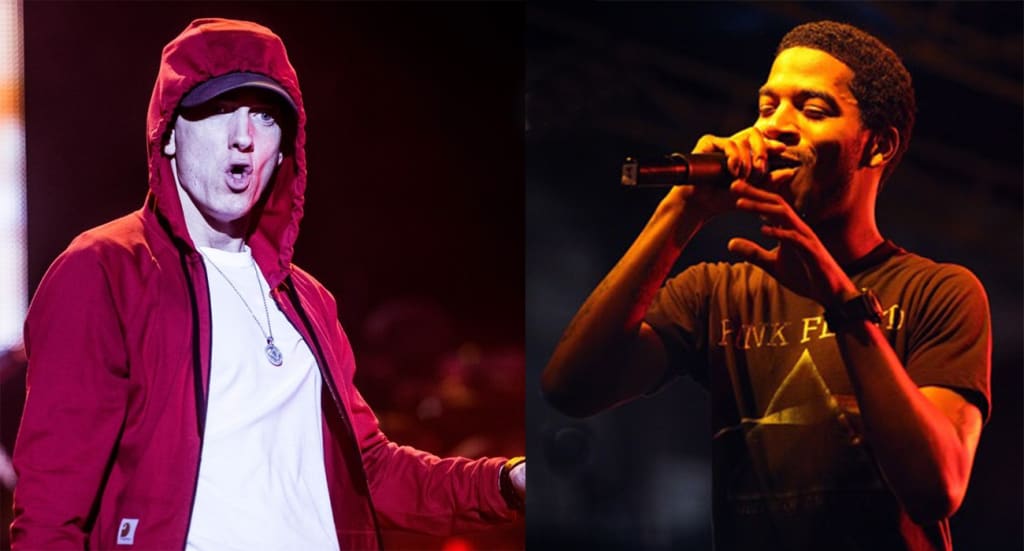Eminem, Kid Cudi, and the Art of the Comeback
The two veteran MCs made impressive comebacks this year. But will they hold up?

Every rapper eventually falls off. It’s unfortunate, but it’s true. Even rappers who reach the pantheon of fame and fortune eventually lose their touch. It’s happened to countless MCs, and it’ll continue to happen far into the future. Twenty years from now kids are gonna be calling Smokepurrp old and making fun of him for dropping his 25th album at the ripe old age of 35. That’s just the game.
While it’s true that every rapper falls off, some rappers manage to make a comeback. They are a rare few, and how they pull it off is still largely unknown to the rest of the washed-up community, but they do it. The luckiest of the lucky can somehow piece together a coherent, noteworthy album from the bones of a fledgling career. Very few rappers have done this better than Eminem and Kid Cudi.
In the case of Eminem, I truly thought all hope was lost. I loved Relapse when it dropped, thought Recovery was okay, but everything after that was so bad I couldn’t even believe it was coming from Eminem. I never thought I’d see the day where Marshall “I Just Don’t Give a Fuck” Mathers would work with top-40 pop stars. Unfortunately, I did see the day. I saw that day dozens of times over the course of three albums. After Recovery, I thought he might be able to salvage something. I lost a little hope after the Marshall Mathers LP 2. By the time Revival rolled around, I had been seeped in so many trash Em features that I just didn’t think the man had it in him anymore. I wrote him off as a once-great emcee who achieved legend status far too early in his career and could never reach those heights again. Well, I’ve been wrong before and I’ll be wrong again.
Em shocked listeners when he surprise-released his new album Kamikaze, a 13-track takedown of the current rap scene, the current rap journalism scene, and popular culture at large. The opening track “The Ringer” is basically a four minute manifesto where Em describes exactly what drove him to write this record. The beat is modern, but not so modern that Em sounds out of place. The rhymes are, unsurprisingly, incredibly impressive. Shady has never had a problem with technical rhyming. But what surprised me most about the track is how natural he sounds. He sounds like he’s back in his comfort zone. Not rhyming breathlessly over stadium pop beats, not crooning about his failed marriage for the thousandth time, not making endless toilet-humour level punchlines. None of that nonsense. On “The Ringer,” and Kamikaze in general, Em is rhyming with a hunger and a passion that we haven’t heard in nearly a decade. We missed this Eminem dearly.
I suppose Eminem just got too comfortable. He says as much himself on the Joyner Lucas assisted “Lucky You.” Em raps “Coming from humble beginnings, I’m somewhat uncomfortable winning,” indicating that he doesn’t like being at the top. He prefers to fight. Em doesn’t wanna just sit in his throne and lord over everybody. He wants rappers to come for his head. He wants to almost lose it and gain it back by the hairs on his neck. He enjoys the thrill. And since no one was coming for the throne, he decided to shoot first, dissing Lil Pump, Lil Xan, MGK, and mumble rappers in general. He also comes at critics who panned his last record. It’s hard to tell if he actually believes Revival is worth defending, or if he’s just being tongue-in-cheek. Either way, I’m just glad that Em feels like he has something to prove again.
Kid Cudi, on the other hand, fell off for a very different reason—mental health. The Cleveland rapper has been open about his longtime struggle with depression, anxiety, and drug abuse. However, Cudi’s mental health seemed to reach a staggering low after the release of his self-produced alt-rock album Speeding Bullet 2 Heaven\. I personally enjoyed the album quite a bit, but the internet (and critics) felt very differently. The hatred for that album is some of the strongest I’ve ever seen for a mainstream release. It was nearly universal. This was likely fueled by the fact that Cudi had been dropping subpar material for a few years now, as well as by the fact that, stylistically, it was completely out of left field. The album was easily his most personal ever, and the world ripped it to shreds. It was like he opened up his personal diary to the public and we collectively took a shit on it because it wasn’t written like a goddamn Faulkner novel. It highlighted some of the worst aspects of the internet’s “fan culture.” The response to Speeding Bullet went beyond negative critical reception, and veered into actual attacks on Kid Cudi the rapper, as well as Scott Mescudi the person.
Cudi was relatively silent after the public reacted to Speeding Bullet. He emerged a while later, promoting a new record called Passion, Pain, and Demon Slayin’. However, before it could be released, Cudi announced on social media that he would be delaying the release of his album and heading to rehab to deal with suicidal thoughts. Here’s where Cudi’s fall from grace differs from Eminem’s; Cudi’s was influenced almost entirely by environmental factors that are completely out of his control. Passion, Pain, and Demon Slayin’ was released during Cudi’s stint in rehab. The reception was mostly mixed. Many felt like the album was a decent return to form for Cudi, but it was just way too bloated. I can’t say I disagree with that consensus.
After Cudi got out of rehab, he did some light promotion for his record, and then went into hiding again. Only this time, he had Kanye West by his side. Kanye had recently had a very public mental breakdown that culminated in him completely breaking down on stage as Cudi held him. The two vanished for several months, eventually returning with a collaborative album titled Kids See Ghosts. The critical reception was overwhelmingly positive, as was fan reception. Kanye has some great contributions to the record, but the true star of the show is Cudi. KSG is his first real return to form. He builds on his tried-and-true psychedelic rap style to create something fresh, something new, something we had been waiting for.
Comebacks are tricky, and we can learn a few valuable things about them from Eminem and Kid Cudi’s stories. First of all, the comeback has to be welcomed. You can’t make a comeback if no one wants you back. The simple fact is: people still want to hear Kid Cudi and Eminem music. The same can’t really be said for many other artists who have fallen off. The second thing we can learn is that you can’t simply rehash old topics, old concepts, and old ideas. You have to build on what made your music great in the first place. Listeners need a reason to put on your new record as opposed to the old ones. Eminem kept things fresh by adopting modern production, flows, and deliveries while still maintaining his cartoon-ish songwriting and mile-a-minute rap style. Cudi switched it up by rapping over more experimental beats, with less of a pop-gloss. However, he still held onto that ever-relatable writing style that makes fans like me feel all warm and fuzzy inside. The third and final thing we learn about comebacks is that audiences love them. The general public has a sick obsession with building people up, tearing them down, and then watching them fight through the ashes. It’s a manufactured underdog story. Many comeback albums do well initially, simply because the allure of the comeback is so enthralling to listeners. However, these records often lack any meaningful staying power, mostly due to the fact that the excitement of the comeback eventually wears off, leaving a sub par album in the aftermath. In order to truly have a comeback, an artist has to create a fresh, new, exciting project that retains an element of what made them popular in the first place. This is a near impossible task, as evidenced by the small handful of artists who have achieved it.
Eminem and Kid Cudi had two of the strongest comebacks of the decade, right up there with A Tribe Called Quest’s legendary 2016 comeback We Got It From Here, Thank You For Your Service. While it’s not exactly clear what direction they will take from this point, I’m extremely excited to see what the future holds for them. That’s not something I’ve been able to say for quite some time.
About the Creator
Kyle Mantha
Kyle Mantha is a writer from Ottawa, Ontario, Canada. You can find him on Twitter (@popejeans) making fun of your favourite rapper.






Comments
There are no comments for this story
Be the first to respond and start the conversation.